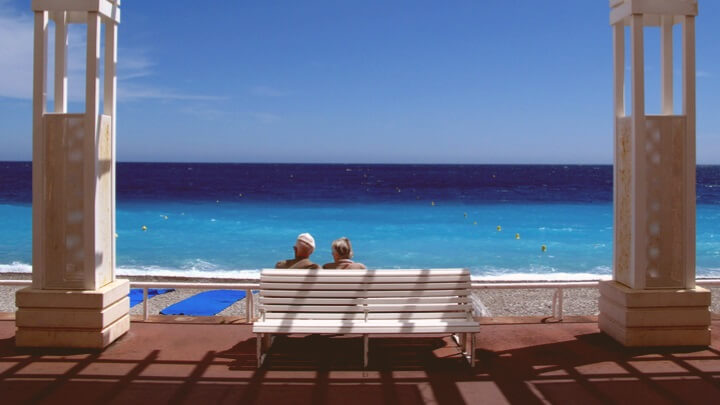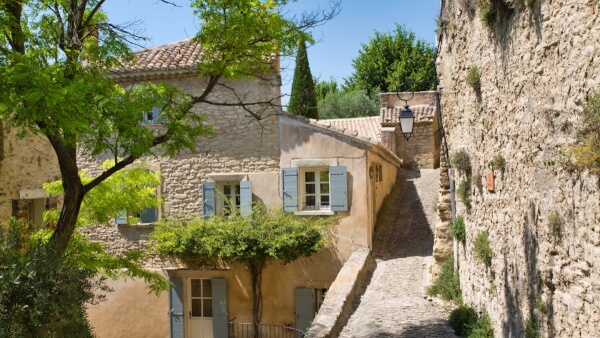Expat health insurance for France: A complete guide
Learn everything you need to know about expat health insurance for France, from finding the best providers to accessing healthcare and managing costs.

France is a hugely popular place for retirees, so whether you're a Brit, an American or an Australian you might be considering setting up your home to enjoy expatriate life in retirement. There are large communities of foreigners in the towns and cities in France, but the mild weather and lure of the rural life means you’ll also come across many expat seniors settling in the countryside.
If you’re considering retiring in France, you’ll need to know a bit about how to go about arranging your move and the type of lifestyle you can expect there. Here’s a complete guide to how to retire in France as an expatriate.
France is one of the 11 founding members of the Eurozone, with euros coming into circulation as the only legal tender as of 2002. Other currencies aren’t widely accepted, so you’ll need to open a French bank account and get used to using euros when you retire in France.
Exchange rates rise and fall, so it’s worth keeping an eye on the market so you know what your money will be worth in France. You can always get the most up-to-date figures by using an online currency converter, but at the moment, here are some general, rounded figures to give you a basic understanding:
France is a developed country and the standard of living is high. This means that life isn’t cheap, but you can usually find everything you need to live a comfortable life fairly easily, even in relatively rural areas. The data site, Numbeo, provides average cost of living data which can give valuable insight into the prices of everyday essentials, entertainment and travel in different locations.
| Regular goods | Average price in France (EUR)* |
|---|---|
| Three course meal for two at mid-range restaurant | €46.00 |
| One litre of milk | €0.94 |
| Loaf of white bread | €1.31 |
| Bottle of wine (mid-range) | €6.00 |
| Petrol (one litre) | €1.27 |
| City centre apartment rental (one bedroom) | €645.68 |
| City centre apartment rental (Three bedroom) | €1,144.21 |
These calculations are from Numbeo, which aggregates cost of living figures entered by locals. They are an average across the country. Therefore, the actual costs will vary by region and city.
It’s definitely a good idea to do your research, and take into account all the costs connected with retiring in France.
One expensive pitfall for many expats is the high fees levied for international money transfers. If you need to regularly move money from a bank account at home to your French bank account, then it’s good to know that your home bank might not be the cheapest option for this service. Often, banks apply high charges for international money transfers you may not be aware of - often, these fees are hidden in poor exchange rates. You can get a much better deal by using a specialist service like Wise, where you can move your money from one country to the other using the real exchange rate and with a low fixed fee - leaving you with more money to enjoy your retirement.
The cost of living in France varies enormously based on the type of lifestyle you lead, and where you choose to live. Numbeo estimates that a single person in Paris would need over €850 a month to live, excluding rental costs. Given that Paris is notoriously expensive to rent, you can expect to see your bill double at least if you’re looking to let a place and retire comfortably in the capital. Of course, you might prefer to buy a property in France, which could bring down your daily expenses significantly.
If you’re looking to live on a more modest income, then your best bet is to try outside of the capital. Some other regional cities are significantly more accessible in terms of cost of living. A monthly income of just over €600 will be enough to live in Marseille, for example, while less than €700 should also cover your costs (excluding rent) in Nantes.
Life in any city in France is going to be relatively costly, so if you’re looking to retire cheaply in France, then looking for a smaller town or more rural property is your best bet. Older homes in the countryside are often very well priced, and consumer goods in general can be less expensive there.
You can estimate the cost of living in France, based on the city you're interested in, and your own lifestyle online.
France is a large country with a varied geography, leading to differences in the temperatures and climate in the regions. The long term averages, of course, don’t reflect day to day changes in temperatures, and summer in the city somewhere like Paris or Cannes can be sweltering. The mountainous areas of France, such as the Alps and Pyrenees, naturally have much harsher winters and cooler summers.
| City in France | Winter Average Lowest Temp | Summer Average Highest Temp |
|---|---|---|
| Paris | 5°C (41°F) | 20°C (68°F) |
| Bordeaux | 6°C (43°F) | 21°C (69°F) |
| Cannes | 8°C (46°F) | 22°C (72°F) |
| Grenoble | 6°C (43°F) | 16°C (61°F) |
| Rouen | 7°C (44°F) | 14°C (58°F) |
| Strasbourg | 7°C (44°F) | 15°C (60°F) |
While most people in France live in the towns and cities, there are also large rural communities, which often include expats. The pastimes available for retirees will vary depending on the type of community you choose to live in - but wherever you go, you can’t escape the French favourite of boule (also called pétanque). This game involves throwing or rolling fairly heavy steel balls to get as close as possible to a target (usually a small wooden ball). You’ll see pétanque competitions going on all over France in mild weather, in specially designed gravelled areas, in parks and public spaces.
If you’re planning on moving to Paris, then the Paris for Seniors website is a fun blog describing the lifestyle, and the type of activities you might take part in if you move to the French capital.
France is a large and varied country. The capital, Paris, is a truly global city, with a huge expatriate community. However, renting in Paris is notoriously expensive, and it can be hard to find a perfect retirement home. If you’re thinking of living in Paris, it’s a good idea to plan a short stay before you commit to a tenancy, or buy a property. Paris is made up of arrondissements (neighbourhoods), which have numbers and names, although you’ll typically just see the numbers used. Each neighbourhood has a distinct flavour. Some areas are more rowdy than others, for example, with some more bohemian. As in all major cities, other areas are blighted by urban decay and poverty, which can lead to issues with petty crime. It pays to do some research in advance.
If you’re looking for somewhere a little smaller than Paris, but still with all the amenities of a large city, then Bordeaux is worth considering. This city in south-west France has a large expat community, and the area is particularly popular with British retirees. Not only is the climate the best of Southern France, Bordeaux is a historic city in the centre of one of France’s most popular wine regions. The city is relatively safe to live in, although naturally you should exercise caution. You can compare the crime rates in Bordeaux with your hometown, using Numbeo.
Another attractive region for retiring expats coming to France is Normandy. Although this northern area has slightly more harsh winters than the south of the country, the summer weather is more moderate than that in the far south, and property prices tend to be very reasonable. There are various towns in Normandy which you could consider, like the port of Honfleur, or smart Deauville - or you could choose to get off the beaten track and find something much more rural.
France is a member of the EU, which means that EU, EEA and Swiss nationals can live in France visa-free. This means that if you’re a Brit looking to retire in France you don’t need a visa, but you should remember there might be other processes required when you arrive in France. For example, you might have to register your residence at your local mairie (town hall). The requirements might vary depending on your specific circumstance, so your best bet is to talk directly to the mairie staff and find out what’s needed in your local area.
If you’re an American citizen planning to retire in France, you’ll need a long-stay ‘visitor’ visa. This is the visa type intended for people planning on staying in France for more than three months who won’t be doing paid work. Visas are issued by the French Consulate closest to your home in America. You’ll have to attend a meeting in person, and your application should usually be made about three months before you intend to travel. Each consulate will have a slightly different way of arranging appointments, so you should check with your local consulate to get the full details.
The long-stay ‘visitor’ visa is also the right visa for most Australians looking to retire in France. You can get a whole list of the documents needed and the process you have to follow to apply, from the website of your local French Consulate. It’s worth remembering that the visitor visa has limitations, and you might also need to register for a residence permit once you arrive in France, depending on your situation. Your Consultate will advise you at your application meeting.
The French Government provides a guide to all aspects of moving to France, which is available in various different languages online. This is a great place to start when you’re considering the steps needed to be able to retire in France.
The opportunity of retirement in France attracts people from all over the globe. Whether you’re looking to spend time in the cultural hustle of Paris or retire to a small holding in the French countryside, you’ll be welcomed by a community of expats who have already made the leap.
Good luck, and enjoy planning your dream retirement in France.
*Please see terms of use and product availability for your region or visit Wise fees and pricing for the most up to date pricing and fee information.
This publication is provided for general information purposes and does not constitute legal, tax or other professional advice from Wise Payments Limited or its subsidiaries and its affiliates, and it is not intended as a substitute for obtaining advice from a financial advisor or any other professional.
We make no representations, warranties or guarantees, whether expressed or implied, that the content in the publication is accurate, complete or up to date.

Learn everything you need to know about expat health insurance for France, from finding the best providers to accessing healthcare and managing costs.

Read our guide on the pitfalls of buying property in France and avoid the most common mistakes.

This guide explains French hospital bills including what UK visitors and expats need to pay, how to get a GHIC refund, and more.

Staying in France for over 90 days? Find out which long-stay visa you need and how to apply. Plus, make your money go further in France with a Wise account.

Can I keep my French bank account if I move abroad? Find out everything you need to know here in our handy guide.

Read our helpful guide on how to transfer a UK pension to France, including the steps, fees and taxes involved.